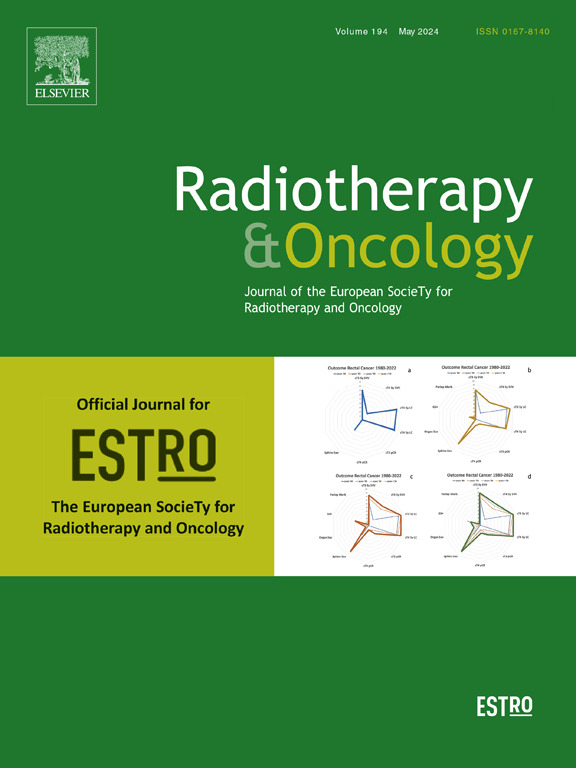估计辐射剂量对接受胸部放射治疗的癌症患者免疫细胞的预后意义:一项荟萃分析。
IF 5.3
1区 医学
Q1 ONCOLOGY
引用次数: 0
摘要
背景与目的:越来越多的证据表明,对免疫细胞的过量辐射剂量可能损害宿主免疫力,并对癌症预后产生负面影响。然而,不同癌症类型和治疗方式的估计辐射剂量对免疫细胞的预后影响仍不确定。本荟萃分析旨在系统评估肺癌和食管癌放疗患者免疫细胞估计辐射剂量与生存结果之间的关系。材料和方法:我们系统地检索PubMed, EMBASE和Cochrane图书馆,直到2025年4月,遵循PRISMA指南。采用随机效应模型计算总生存期(OS)、无进展生存期(PFS)、无病生存期(DFS)、局部区域无进展生存期(LPFS)和远端无转移生存期(DMFS)的合并风险比(hr)和95%置信区间(ci)。结果:16项研究纳入了4511例患者,其中1073例诊断为食管癌,3438例诊断为肺癌。合并分析表明,较高的免疫细胞估计辐射剂量与较差的生存期显著相关(HR = 1.228; 95 % CI, 1.135-1.329; p )结论:较高的免疫细胞估计辐射剂量与不良的生存结局有关。免疫保留放疗策略可改善预后,值得进一步研究。本文章由计算机程序翻译,如有差异,请以英文原文为准。
Prognostic significance of estimated radiation dose to immune cells in cancer patients undergoing thoracic irradiation: A meta-analysis
Background and purpose
Emerging evidence suggests that excessive radiation dose to immune cells may impair host immunity and negatively affect cancer prognosis. However, the prognostic impact of the estimated radiation dose to immune cells across different cancer types and treatment modalities remains inconclusive. This meta-analysis aimed to systematically evaluate the association between estimated radiation dose to immune cells and survival outcomes in patients with lung and esophageal cancers undergoing radiotherapy.
Materials and methods
We systematically searched PubMed, EMBASE, and Cochrane Library up to April 2025 following PRISMA guidelines. Pooled hazard ratios (HRs) with 95% confidence intervals (CIs) were calculated using a random-effects model for overall survival (OS), progression-free survival (PFS), disease-free survival (DFS), locoregional progression-free survival (LPFS), and distant metastasis-free survival (DMFS).
Results
Sixteen studies comprising 4511 patients were included, with 1073 patients diagnosed with esophageal cancer and 3438 with lung cancer. The pooled analysis demonstrated that higher estimated radiation dose to immune cells was significantly associated with inferior OS (HR = 1.228; 95 % CI, 1.135–1.329; p < 0.001) and PFS (HR = 1.265; 95 % CI, 1.134–1.412; p < 0.001). Similar associations were observed for DFS (HR = 1.227; 95 % CI, 1.009–1.492), LPFS (HR = 1.091; 95 % CI, 1.042–1.141), and DMFS (HR = 1.172; 95 % CI, 1.066–1.290). Subgroup analyses revealed consistent findings across tumor types, geographic regions, age groups, sample sizes, and the estimated radiation dose to immune cells cutoff values. Funnel plot asymmetry and statistical tests suggested potential publication bias; however, trim-and-fill analyses confirmed the robustness of the results. Sensitivity analyses further supported the stability of pooled estimates.
Conclusions
Higher estimated radiation dose to immune cells is linked to adverse survival outcomes. Immune-sparing radiotherapy strategies may improve prognosis and warrant further investigation.
求助全文
通过发布文献求助,成功后即可免费获取论文全文。
去求助
来源期刊

Radiotherapy and Oncology
医学-核医学
CiteScore
10.30
自引率
10.50%
发文量
2445
审稿时长
45 days
期刊介绍:
Radiotherapy and Oncology publishes papers describing original research as well as review articles. It covers areas of interest relating to radiation oncology. This includes: clinical radiotherapy, combined modality treatment, translational studies, epidemiological outcomes, imaging, dosimetry, and radiation therapy planning, experimental work in radiobiology, chemobiology, hyperthermia and tumour biology, as well as data science in radiation oncology and physics aspects relevant to oncology.Papers on more general aspects of interest to the radiation oncologist including chemotherapy, surgery and immunology are also published.
 求助内容:
求助内容: 应助结果提醒方式:
应助结果提醒方式:


